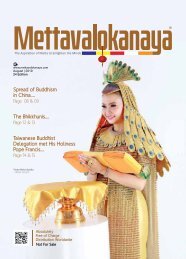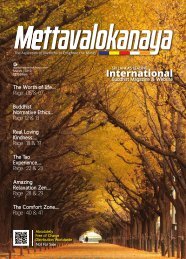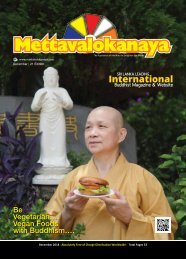#Mettavalokanaya_International_Buddhist_Magazine_May_2021
This is the World’s Most Popular & Leading Monthly International Buddhist Magazine, “Mettavalokanaya” on May 2021 Vesak Edition - 31. https://mettavalokanaya.com/magazine-31/ http://www.mettavalokanaya.com/
This is the World’s Most Popular & Leading Monthly International Buddhist Magazine, “Mettavalokanaya” on May 2021 Vesak Edition - 31.
https://mettavalokanaya.com/magazine-31/
http://www.mettavalokanaya.com/
You also want an ePaper? Increase the reach of your titles
YUMPU automatically turns print PDFs into web optimized ePapers that Google loves.
Happiness
and Pleasure….
Happiness and pleasure are
often confused, although
they have different qualities.
Pleasure is short-lived. It’s
not sustainable; it doesn’t fulfill
us. It’s empty of true substance or
nourishment. Eating good food can
bring you pleasure. If you’re hungry,
this enjoyable experience can seem
to be the same as happiness. But
you can’t keep eating and eating; if
I force-fed you after you were full,
what would you feel? Pleasure is
ephemeral. It comes with a limited
capacity and an inevitable saturation
point. During my mandatory military
service in Singapore, I counseled
addicts. They described the intense,
transient pleasure they got from
drugs. When they came down, they felt
hollow and desperate. It’s the same
with all our appetites, the things that
give us pleasure. When you’re itchy,
you scratch, but the scratching doesn’t
get rid of the itch; it just replaces one
sensation with another. We always
want the quick, easy way out. Pleasure
does not give us complete and total
satisfaction, yet we constantly chase
it. Why?
Perhaps because we have an
underlying sense of fear. These states
are simply other kinds of distractions
from our fundamental existential
discomfort. We feel, unconsciously,
that something is missing. We rarely
feel completely whole, and yet we
crave wholeness. We’re afraid of our
own mortality and insignificance.
Admitting this is terribly hard for us,
“Meet
Mind to
Mind”
so we develop defense mechanisms:
One more potato chip. Another
chocolate bar. Another drink or joint.
We bury and camouflage this part of
ourselves, chasing after things that do
not really satisfy us. Looking at what
is fearful, insecure, and dissatisfied at
our core can be a painful process. We
don’t want to look, but it’s a necessary
step if we want to grow. Instead of
always chasing after pleasure, we
would feel much more satisfied if we
cultivated joy. Pleasure is just physical
stimulation, but joy is something more
mental and fulfilling. Pleasure is all
about me and my selfish sensations;
joy comes from embracing what is—
and from gratitude.
I’ve always wondered why we
crave pleasure when it’s so obviously
ephemeral. Why do we chase after
ownership and material possessions
when the satisfaction they bring is so
fleeting? Even as a young man I knew
happiness must be elsewhere— this is
what pushed me toward becoming a
monk. It led me to Chan, and it’s why
I kept asking, “What is my original
nature?” “Who am I?” “What is it?” I
kept digging and asking and returning
to these questions over and over. I
wanted something more lasting and
stable than pleasure. I wanted to find
true happiness.
We often confuse reacting with
responding, which creates all kinds
of trouble. In English, the meaning of
the two words is somewhat different,
but they do not stand in opposition
to each other in quite the same way
Most Venerable Master
Zhengyan Guo Jun Thero
Worldwide Popular
Chan Master and
Chief Abbot of
Mahabodhi Temple
Singapore
they do in Chinese. To react is fanying,
which means to fan a fire, to make the
flames jump up. Fan means “opposite,”
and ying, as it’s written in the Chinese
character, means “to resonate.” Fanying
could be thought of as something
like Newton’s first law: for every
action there is an equal and opposite
reaction. You shout in the mountain,
and the sound comes echoing back.
Slap someone in the face, and your
palm stings. Spit up into the sky, and
it comes back in your face.
To respond, on the other hand, is
ganying. Gan means to feel, to be able
to sense, to be in tune. Ganying then is
to empathize, to attune, to come into
alignment with rather than to oppose.
It means to feel and to resonate.
Xiangying, a related word, means to
feel together: to meet mind to mind,
eye to eye, heart to heart. We so often
react rather than respond. All that
does is fan the flames. We run around
frantically putting out fires! We push
back when we feel pushed. Hurt when
we are hurt. Stand in opposition when
we want to be close. Shout when we
want to be heard. Lash out when
we want to be embraced. When you
find yourself reacting, come back
into the present moment. Relax your
discriminating mind, and rest all the
grasping and rejection inside of you
that says, “I am over here, and you are
over there,” “I am right, and you are
wrong.” Let others reach you. Resonate
with them. Breathe with them. Be with
them. Respond. The Buddha heart is
as big as the universe. Limitless.
8 l Mettavalokanaya l May l 2021 2021 l May l Mettavalokanaya l 9
















